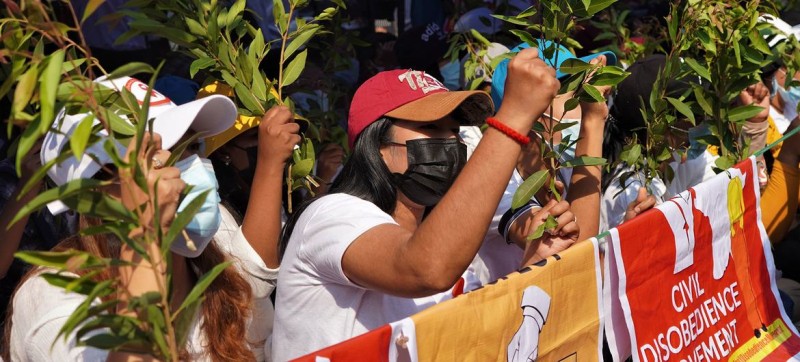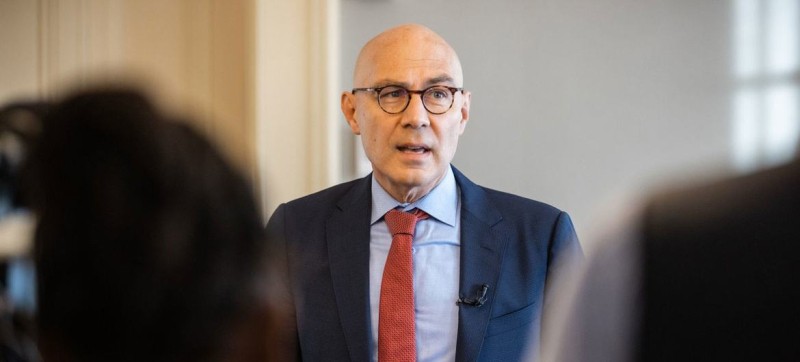
© Unsplash/Saw Wunna People protest against the military coup in Myanmar. (file)
“By nearly every feasible measurement, and in every area of human rights – economic, social and cultural, as much as civil and political – Myanmar has profoundly regressed,” he said.
Tweet URL
“Despite clear legal obligations for the military to protect civilians in the conduct of hostilities, there has been consistent disregard for the related rules of international law”, the head of OHCHR added.
Indiscriminate attacks
“Far from being spared, civilians have been the actual targets of attacks – victims of targeted and indiscriminate artillery barrages and air strikes, extrajudicial executions, the use of torture, and the burning of whole villages.”
The UN rights chief saluted the courage of all those who have lost their lives so far “in the struggle for freedom and dignity in Myanmar, and the continuing pain and suffering of their families and loved ones.”
According to credible sources, said OHCHR, at least 2,890 people have died at the hands of the military and others working with them, of whom at least 767 were initially taken into custody.
This is almost certainly an underestimate on the numbers killed by the military.
1.2 million forced to flee
A staggering 1.2 million Burmese have been internally displaced, and over 70,000 have left the country – joining more than a million others who have fled, including the bulk of the country’s Rohingya Muslim population, who’ve suffered decades of sustained persecution and attacks, OHCHR noted.
Credible information indicates that over 34,000 civilian structures, including homes, clinics, schools and places of worship, have been burned over the past two years, the rights office said.
And Myanmar’s economy has collapsed with nearly half of the population now living below the poverty line.
Since 1 February 2021, the military has imprisoned the entire democratically elected leadership of the country and, in subsequent months, detained over 16,000 others – most of whom face specious charges in military-controlled courts, in flagrant breach of due process and fair trial rights, linked to their refusal to accept the military’s actions, OHCHR underlined.
Finding a way out
“There must be a way out of this catastrophic situation, which sees only deepening human suffering and rights violations on a daily basis,” said Mr. Türk. “Regional leaders, who engaged the military leadership through ASEAN (the Association of Southeast Asian Nations) agreed a Five-Point Consensus that Myanmar’s generals have treated with disdain.”
“Two of the critical conditions that were agreed – to cease all violence and to allow humanitarian access – have not been met”, he continued. “In fact, we have seen the opposite. Violence has spiralled out of control and humanitarian access has been severely restricted.”
Release Aung San Suu Kyi
The High Commissioner pointed to other political measures that would be crucial to resolving the crisis. First, the release of all political prisoners, including State Counsellor Aung San Suu Kyi and President U Win Myint, as called for by the UN Security Council.
He said inclusive dialogue with all parties was essential, involving both the ASEAN Chair and the UN Special Envoy. OHCHR must be given meaningful access to the country to monitor the situation independently and impartially, he added.
“Restoring respect for human rights is a key to ending this crisis, to end this situation where Myanmar’s generals are trying to prop up through brute force a decades-old system in which they answer to no-one but themselves,” said Mr. Türk.
“Those responsible for the daily attacks against civilians and the human rights violations must be held accountable”, said Mr. Türk.

Volker Türk United Nations High Commissioner for Human Rights Volker Türk.
Return to civilian rule
“The military needs to be brought under real, effective civilian oversight. This will be difficult to achieve, but these elements are critical to restoring any semblance of democratic rule, security and stability to the country.”
He noted that the Security Council united “to adopt a path-breaking resolution that demanded an immediate end to the violence, among other urgent steps”, just last month.
“Now it is time for the world to come together to take common actions to stop the killing, protect the people of Myanmar, and ensure respect for their universal human rights.”

